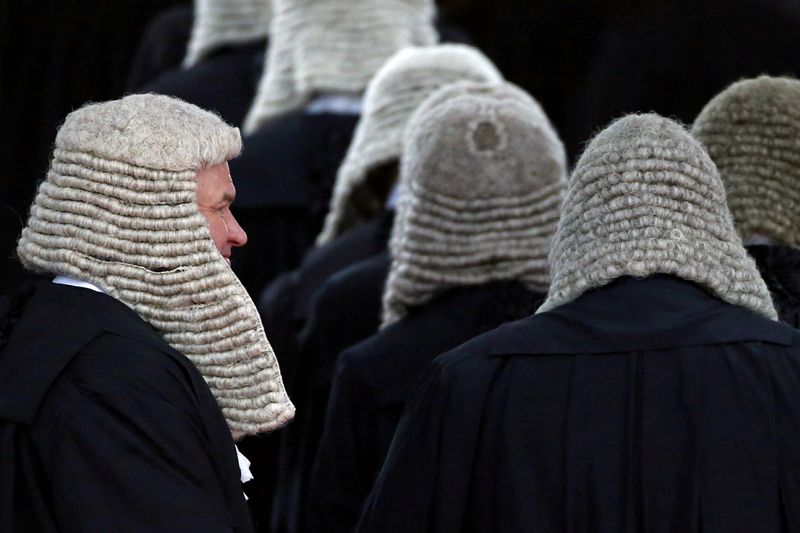By Yew Lun Tian
BEIJING (Reuters) - Beijing's planned national security legislation for Hong Kong is set to block its foreign judges from handling national security trials, people familiar with the matter said, which would exacerbate concerns about the city's judicial independence.
Having lost patience with Hong Kong's failure to adopt national security legislation on its own, China announced on Thursday that it would directly enact laws to tackle secession, subversion, terrorism and foreign interference in the city.
The legislation, which the sources said remains subject to change, would also see both central and city government security agencies set up in Hong Kong, they said.
The people familiar with the issue declined to be identified because they are not authorised to speak to the media.
The Hong Kong government has said the legislation would not affect its judicial independence.
The Legislative Affairs Commission of the Standing Committee of the National People's Congress could not immediately be reached for comment. China's Hong Kong and Macau Affairs Office did not immediately respond to a request for comment.
Beijing's push for the legislation follows months of anti-government protests in Hong Kong last year, fuelled by fears among many in the city of the erosion by Beijing of its autonomy under a "one country, two systems" system set up when it was handed from British to Chinese rule in 1997.
China blames the protests on anti-China “troublemakers”, aided at times by unspecified foreign and external forces.
It has not said when the legislation would be completed but sources and delegates to China's parliament said it was likely to be enacted before Hong Kong legislative elections in September.
Hong Kong's foreign judges stem from an arrangement established at its 1997 handover to help maintain its credibility as an international financial hub.
Its highest court, the Court of Final Appeal, has 23 judges, of whom 15 are foreign, from places like Britain, Canada and Australia. All serve as non-permanent members of the court, which means they are called on periodically to sit on cases.
While under the new law they would no longer be able to handle national security cases, they will not be excluded from civil, financial or other cases, the sources said.
However, any move to limit the role of foreign judges is likely to alarm some Hong Kong lawyers and judges, who already fear the city's vaunted judicial independence is under threat from Beijing's Communist Party leadership.
The Hong Kong Bar Association said China's plan to impose the law without public consultation or local legislative scrutiny had caused "deep unease in the local and international community".
JUDICIAL TRADITION
Hong Kong's mini-constitution, known as the Basic Law, enshrines the independence of the judiciary and states that judges may come from other common law jurisdictions.
Andy Tsang, a delegate to China's parliament, the National People's Congress (NPC), said he was not aware of details in the yet-to-be-drafted legislation that could bar foreign judges from national security cases, but cited a similar set-up in nearby Macau.
Macau, a semi-autonomous former Portuguese colony, barred foreign judges from hearing national security cases in 2018.
"In Macau ... only judges of Chinese nationality can hear cases relating to national security, and I believe that will be a very good reference," Tsang, a former Hong Kong police commissioner, told Reuters in an interview on Monday.
Another Hong Kong delegate to the largely rubber-stamp NPC, Maggie Chan, proposed a National Security Court where cases could only be heard by Chinese judges, Hong Kong media cited her as saying on the sidelines of the NPC.
INTELLIGENCE AGENCIES
The new legislation is also expected to enable Beijing to establish intelligence agencies in Hong Kong. Mainland security and intelligence services now have no enforcement powers in the city.
The law could also clear the way for a domestic intelligence agency in Hong Kong similar to the colonial-era Special Branch, to deal with national security threats, the territory's previous leader, Leung Chun-ying, told Reuters in an interview on Saturday.
Tsang, now an officer with China's Ministry of Public Security (MPS) and deputy director of the National Narcotics Control Commission, said that either the MPS or the Ministry of State Security, China's main intelligence agency, or both, could be involved in a new security unit in Hong Kong.
"The bill actually says that, the city itself, and the country, will set up dedicated unit, to uphold national security," he said.
"I would expect the national security agencies will work with the local police in order for the national security of the country (to) be protected."
Hong Kong has a 700-officer Security Wing that serving and retired police say has been increasingly involved in monitoring some activists and counter-terrorism operations.
Senior Security Wing officials liaise with mainland security services but Tsang said he expected the new agency to have the powers to investigate, arrest and detain.

"We need this, because we need to act according to the law. And so we would expect the new law to be passed will contain these elements," he said.